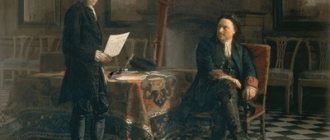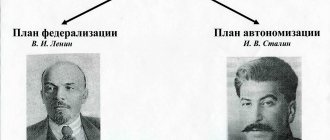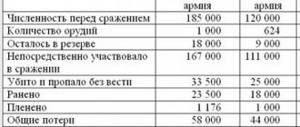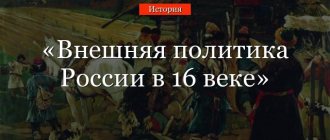Presentation on the topic “Alexander 2”
Presentation on the topic “Alexander II” on history in powerpoint format. An interesting presentation for schoolchildren tells about the personality of Alexander II, his upbringing, family, children, and reform activities. Author of the presentation: Moiseeva Maria
Fragments from the presentation
The youth of Alexander II
- Born on April 17, 1818, on Bright Wednesday, at 11 a.m. in the Bishop's House of the Chudov Monastery in the Kremlin. On May 5, the sacraments of baptism and confirmation were performed on the baby in the church of the Chudov Monastery by Moscow Archbishop Augustine, in honor of which Maria Feodorovna was given a gala dinner.
- Received home education. By 1834 he was introduced by his father into the main state institutions of the empire: in 1834 into the Senate, in 1835 he was introduced into the Holy Governing Synod, from 1841 a member of the State Council, in 1842 - the Committee of Ministers. The future emperor's military service was quite successful. In 1836 he already became a major general, and since 1844 a full general. Since 1849, Alexander was the head of military educational institutions, chairman of the Secret Committees on Peasant Affairs in 1846 and 1848. During the Crimean War of 1853-1856, with the declaration of martial law in the St. Petersburg province, he commanded all the troops of the capital.
Beginning of the reign of Alexander II
- The country faced a number of difficult domestic and foreign policy issues; finances were extremely upset by the unsuccessful Crimean War, during which Russia found itself in complete international isolation.
- The first important step was the conclusion of the Paris Peace in March 1856. In the spring of 1856, he visited Helsingfors, where he met with the Prussian king Frederick William IV (his mother’s brother), with whom he secretly sealed a “dual alliance,” thus breaking the foreign policy blockade of Russia.
- A “thaw” has set in in the socio-political life of the country. On the occasion of the coronation, which took place in the Assumption Cathedral of the Kremlin on August 26, 1856, the Highest Manifesto granted benefits and concessions to a number of categories of subjects, and many others; recruitment was suspended for 3 years; in 1857, military settlements were liquidated.
Reforms of Alexander II
Reasons for starting reforms:
- Firstly, the landowner economy was experiencing a crisis, the efficiency of farms was declining, and the question of the transition from subsistence to market economy was acute.
- Secondly, the rapid development of industry was in conflict with agriculture. There was not enough market for the sale of goods for industry due to the low purchasing power of part of the peasant population. Industry experienced a labor shortage, since serfs, who made up the majority of the population, did not have the right to free movement from village to city to industrial enterprises.
- Thirdly, the country was painfully experiencing the defeat in the Crimean War, which was the result of a military and technical lag behind the advanced countries of the world.
- Fourthly, the country recorded an increasing number of peasant anti-feudal protests. On March 30, 1856, speaking before the Moscow provincial and district leaders of the nobility, Alexander uttered the famous words: “... it is much better to abolish serfdom from above, rather than wait for the time when it begins by itself be canceled from below...” This day is considered to be the day of the beginning of the Great Reforms.
Foreign policy
- He entered Russian history as a conductor of large-scale reforms. He was awarded a special epithet in Russian pre-revolutionary historiography - Liberator (in connection with the abolition of serfdom according to the manifesto of February 19, 1861).
- During the reign of Alexander II, Russia returned to the policy of all-round expansion of the Russian Empire, previously characteristic of the reign of Catherine II. During this period, Central Asia, the North Caucasus, the Far East, Bessarabia, and Batumi were annexed to Russia. Victories in the Caucasian War were won in the first years of his reign. The advance into Central Asia ended successfully (in 1865-1881, most of Turkestan became part of Russia).
- After long resistance, the emperor decided to go to war with the Ottoman Empire in 1877-1878. Following the war, he accepted the rank of Field Marshal (April 30, 1878).
- In 1876-1877, Alexander II took personal part in concluding a secret agreement with Austria in connection with the Russian-Turkish war.
- In 1867, Alaska (Russian America) was sold to the United States for $7 million.
- Historian P. A. Zayonchkovsky believed that the government of Alexander II pursued a “Germanophile policy” that did not meet the interests of the country, which was facilitated by the position of the monarch himself: “Revering before his uncle, the Prussian king, and later the German Emperor Wilhelm I, he in every possible way contributed to the formation of a single militaristic Germany." During the Franco-Prussian War of 1870, “St. George’s crosses were generously distributed to German officers, and insignia of the order to soldiers, as if they were fighting for the interests of Russia.”
Family of Alexander II
- Surprisingly, both marriages of Alexander II were formally morganatic:
- First marriage (1841) - official, with Maria Alexandrovna (07/1/1824 - 05/22/1880), nee Princess Maximiliana-Wilhelmina-Augusta-Sophia-Maria of Hesse-Darmstadt, illegitimate daughter of Wilhelmina of Baden, wife of Grand Duke Ludwig II of Hesse (from chamberlain), who was subsequently forced, in order to avoid a scandal, to recognize her and his wife’s other children from the chamberlain as his own. This story was not a secret for Alexander, as for all of Europe, and caused a negative attitude on the part of his parents.
- The second, morganatic, marriage with a long-time (since 1866) mistress, Princess Ekaterina Mikhailovna Dolgorukova (1847-1922), who received the title of Most Serene Princess Yuryevskaya.
- Children from marriage with Princess Dolgorukova (legalized after the wedding):
- His Serene Highness Prince Georgy Alexandrovich Yuryevsky (1872-1913);
- Your Serene Highness Princess Olga Alexandrovna Yuryevskaya (1873-1925);
- Boris (1876-1876), posthumously legitimized with the surname “Yuryevsky”;
- Your Serene Highness Princess Ekaterina Alexandrovna Yuryevskaya (1878-1959), married to Prince Alexander
- Vladimirovich Baryatinsky, and after that - for Prince Sergei Platonovich Obolensky-Neledinsky-Meletsky.
Foreign policy
The beginning of the reign of Alexander II coincided with the end of the Crimean War. According to the terms of the Treaty of Paris, the Black Sea became neutral; no one could have a navy in it, as well as fortresses and arsenals in coastal cities.
Rice. 1. Emperor Alexander II.
15 years later, the London Convention was concluded and Russia regained the right to maintain a fleet in the Black Sea. This turn in foreign policy was caused by the defeat of France in the war with Prussia in 1870-1871.
The Russo-Turkish War of 1877-1878 ended in victory for Russia and the small Balkan states. As a result of the Berlin Congress of 1878, a new state emerged - Bulgaria and an autonomous principality - Eastern Rumelia. The Ottoman Empire recognized the independence of three states - Romania, Serbia and Montenegro. The cities of Batum and Kars in Transcaucasia became part of Russia.
Alexander II and his entourage considered Alaska and the Kuril Islands unprofitable, so the former were sold to the United States in 1867, and the latter were given to Japan in 1875 in exchange for Sakhalin Island. Under the terms of the Aigun and Beijing treaties (1858 and 1860) with the Qing Empire (China), Russia included vast and sparsely populated lands along the Amur and Ussuri rivers. In order to gain a foothold in the new territories, the cities of Vladivostok and Khabarovsk were founded.
A significant part of Central Asia between the Caspian Sea and the Tien Shan, which was annexed in 1865-1881, became a major territorial acquisition for the Russian Empire. The southern border of the empire ran along the Pamir-Pyanj-southeastern coast of the Caspian Sea.
Rice. 2. Chancellor Gorchakov.
Alexander's foreign policy? in 1801-1812
Korol Marina Evgenievna, history teacher
Topic: “Foreign policy of Alexander 1 in 1801-1812.”
Lesson objectives:
- Show the international position of Russia at the beginning of the century; determine the main goals, objectives and directions of the country’s foreign policy; evaluate its effectiveness;
- Find out the causes of the War of 1812;
- Learn to work with historical documents, analyze, highlight the main thing, compare.
Lesson plan:
- Anti-French coalitions
- Russia in the Caucasus
- Russia in the wars of 1806-1807.
- World of Tilsit
- War with Sweden 1808-1809
- Russian-Turkish War 1806-1812
- War with Iran 1804-1813
- Breakdown of Russian-French relations.
Basic concepts:
coalition; convention; continental blockade; eastern question; Sejm.
Main dates:
1801 – voluntary entry into Russia of Eastern Georgia; 1805 – formation of the third anti-French coalition; 1806 – formation of the fourth anti-French coalition; 1804–1813 - war with Iran; 1806–1812 - war with Turkey; 1807 – Peace of Tilsit; 1808–1809 - war with Sweden.
During the classes.
(slide 1) Lesson topic.
(slide 2) Lesson plan
(slide 3) Question.
Remember how relations developed between Russia and the Western powers during the reign of Paul1?
- Russia's break with England and Austria;
- Gradual rapprochement with France;
- Sending 22,500 Cossacks to capture British India;
- Announcement of the cessation of trade with England.
(slide 4) The coup in St. Petersburg on March 11 changed the situation again. Following his father, Alexander I decided to start his foreign policy as if from scratch.
Question.
Guess how Alexander I began his foreign policy?
(slide5) Working with a document
“The government wishes to restore good agreement between both states and is ready to promote this by all means, subject to England’s accession to a maritime convention that does not violate the interests of England.”
From a letter to the Russian envoy in England, Count Vorontsov.
Question.
Which country did Alexander rush to establish relations with first? Why? (harm to the economic interests of the country).
(slide 6)
- Trade with England resumed;
- Cossack units sent on a campaign against British possessions in India were recalled;
- England and Russia concluded a convention “On Mutual Friendship” directed against Bonaparte;
- Russia joined the third anti-French coalition.
(slide 7) Working with the concept and the table.
(slide Working with documents.
Working with documents.
“In politics, Alexander is as thin as the tip of a pin, as sharp as a razor, as false as sea foam.”
From a letter from Swedish diplomat G. Lagerbjelke
“Alexander is smart, pleasant, educated, but he cannot be trusted; he is insincere: he is a true Byzantine... subtle, feigned, cunning.”
Napoleon.
Assess the diplomatic abilities of Alexander I.
(slide 9) Scheme: “The main directions of Russian foreign policy at the beginning of the 19th century.
(slide 10) Napoleon was preparing a landing in England.
Question.
What event prevented France from realizing these plans?
October 21, 1805 The English fleet defeated the Franco-Spanish squadron at Cape Trafalgar.
(slide 11) Napoleon
transferred its main forces to Central Europe.
December 2, 1805 Russian troops advancing to the west and the remnants of the Austrian army met near the village of Austerlitz.
(slide 12) Question.
Under what name did the Battle of Austerlitz go down in history?
(slide13) Opinion of historian A.E. Presnyakov about the Battle of Austerlitz
“And during the army, Alexander
I , without openly accepting command, bound Kutuzov with his decisions, undermining his authority, listening to the contradictory opinions of staff generals”
Question.
What event is being discussed in this passage?
(slide14) Belavin and Brose Parody “Everything Gom”
Question.
1. What events is this poem dedicated to?
2. What were the results of the Battle of Austerlitz? (Napoleon’s army defeated the Austro-Russian army, Russia lost almost 15 thousand of its soldiers and officers. Napoleon got all the artillery, huge convoys and almost 20 thousand soldiers. (The Third Coalition collapsed.)
(slide 15) Russia in the Caucasus. At the same time, Russia pursued an active policy in the Caucasus. 1801 – Eastern Georgia; 1803 Mingrelia; 1804 - Imereti, Guria, Ganja 1805 - Karabakh, Shirvan 1806 Ossetia
Question.
Guess which countries could be concerned about Russia's penetration into Transcaucasia? (Turkey, Iran, European powers)
(slide 16) In 1806, the war in Europe broke out with renewed vigor. The fourth anti-French coalition was created. Napoleon's response was to announce a “continental blockade” of England in 1806.
Work in a printed notebook. Page 6, task 2.
Continental blockade-
a ban on all communications between England and European countries, which was supposed to undermine the British economy.
After the defeat of Prussia, France reached the Neman River, the western border of Russia, and stopped at the town of Tilsit.
(slide 17) Working with a document. Opinion of historian N.F. Dubrovina.
“Who would have imagined that our emperor would enter into an alliance with the head of the guillotine, with the greatest murderer and unworthy tyrant...”
Russian life in N. XIX century
Question
. 1. What historical event are we talking about? (conclusion of the Peace of Tilsit 1807)
2. Think about what circumstances forced Alexander I to negotiate with Napoleon? (Russia's military and material resources are depleted, lack of assistance from the allies, the danger of Napoleon's invasion of Russian territory).
(slide 18) The meeting of the emperors took place on June 25 and was arranged with an extraordinary convention that captured the imagination of contemporaries. In order not to affect the prestige of either side, i.e., so that Napoleon does not enter Russian territory, but
Alexander did not appear in the French camp; a huge raft was installed in the middle of the Neman near Tilsit, on which a pavilion covered with white linen was built with pediments decorated with the monograms of Alexander and Napoleon. In the second hour of the day, two boats simultaneously moored to the raft from the opposite banks of the river, from which Alexander emerged, dressed with special sophistication on this significant day, and Napoleon in a modest uniform and cocked hat. The emperors disappeared into the pavilion and talked in private for two hours. Contemporaries could only guess about the content of their conversation.
(Zaichkin I.A., Pochkaev I.N. Russian history:
from Catherine the Great to Alexander I. M., 1994, pp. 463-464)
(slide 19) Working with the textbook pp. 13-14. Highlight the negative and positive consequences of the Peace of Tilsit.
Work in a printed notebook. Notebook page 8, task 6
Question.
What directions of Russian foreign policy became the main ones after the conclusion of the Peace of Tilsit? (Fight with Turkey, Iran, Sweden)
(slide 20) Taking advantage of the articles of the Peace of Tilsit, Alexander I began a war against Sweden in 1808. In 1 month, Russia defeated the Swedes and captured Finland and the Aland Islands. When Swedish troops approached here, the Russians were forced to go on the defensive. In the fall, the Russians went on the offensive and won a number of victories. In March 1809, troops under the command of General. Barclay de Tolly crossed the Baltic on ice, took Umeå, and the detachment of General P.I. Bagration was sent to the Åland Islands for a subsequent attack on Stockholm.
(slide 21) The defeat of Sweden led to the overthrow of the king. September 1809 Treaty of Friedrichsham. Finland, including the Åland Islands, went to Russia. The Grand Duchy of Finland was created as part of Russia. Sweden joined the continental blockade of England.
(slide 22) In 1806, Napoleon pushed Turkey to start a war with Russia. Moldavia in 1806
and
Wallachia
.
M.I.
became commander-in-chief in 1811. Kutuzov. He quickly stepped up the fighting.
In the battle of Slobodzei
, the Turks were surrounded and began peace negotiations.
In 1812, the Peace of Bucharest
Bessarabia
was part of Russia , Turkey promised to carry out reforms in Serbia. Russia avoided a war on two fronts.
(slide 23) In 1801, Russia annexed Eastern Georgia. In response, in 1804, Iran
started the war.
During the fighting, the Russians occupied parts of Azerbaijan and Armenia. In 1810, Turkey and Persia entered into an alliance. In 1812, the Russians occupied Arkevan and Lenkoran, and in 1813, according to the Treaty of Gulistan,
Russia received a number of territories in the North Caucasus and Transcaucasia.
(slide 24) “I don’t want war, I don’t want to restore Poland, but you yourself want the Duchy of Warsaw to join Russia... Until the secret intentions of your court become open, I will not stop increasing the army stationed in Germany!”
Napoleon to the Russian Ambassador A.B Kurakin
The Tilsit peace was short-lived. Russia suffered colossal losses due to the continental blockade of England, which caused public discontent. France was unhappy that Russia was trading with England through neutral Americans. Napoleon's creation of the Duchy of Warsaw became a clear threat to the sovereignty and territorial integrity of Russia. The new customs tariff introduced by Russia (high duties on luxury goods supplied from France) hit the treasury hard.
War became inevitable.
Literature.
1.A.A. Danilov, L.G. Kosulina History of Russia. 19th century. 8th grade.
2.L.M. Lyashenko. History of Russia 19th century. 8th grade. Didactic materials.
3.E.V. Kolganova, N.V. Sumakova Lesson developments on the history of Russia. 19th century. 8th grade
4. (Zaichkin I.A., Pochkaev I.N. Russian history: from Catherine the Great to Alexander
I. M., 1994, pp. 463-464)
5. History of Russia 19th century. Reader.
6. E.V. Anisimov, A.B. Kamensky Russia in the 18th - first half of the 19th century.







